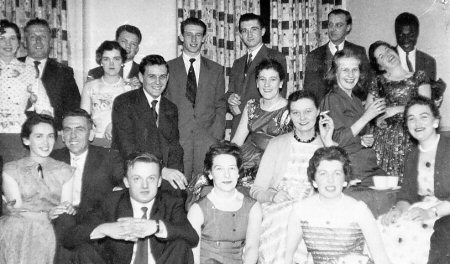O K, so this one is really difficult! But many of those pictured in this great period photo were Irish!
We will start you off with a few names. David Keane, brother of Tommy, ex-V.P. of the Abbey Grammar is in the middle of the back row, and beside him is fellow Lislea man, Johnny O’Donnell.
Johnny died very young, tragically – just a few years after this photo was taken, leaving a young wife.
Just in front of Johnny is Bridget McCann. It was bridget’s sister Elizabeth who loaned me this photo.
At the front and just left of that group we mentioned is a young Dundalk girl, Phyllis Quigley.
The rest is up to you!!
‘It was 1945, following VE Day and my sister and I were leaving Co Down to begin a career in nursing in
We arrived safely at Liverpool Docks and made our way to the hospital, just to find that our luggage had been delayed in transit. Matron was not to be, even temporarily, deprived of two extra pairs of hands and she promptly produced very thick lisle stockings and long white coats, which, along with our ordinary shoes – entirely unsuited to hospital floors – comprised our uniform. I was lucky enough to find myself in the children’s ward where my ‘uniform’ was not noticed. However my sister in Male Surgical Ward earned the opprobrium of the doctor in charge.
Seniority was the name of the game. Even someone who started nursing one month before you was your senior. Matron presided at the head of the table with the latest batch of students at the bottom. Platters of food were delivered first to the head, and there was not much food left by the time they reached our end. Even going through a door, you had to stand aside for a nurse who was senior to you.
Our daily work was a round of making beds, washing and dusting lockers and serving meals. A good hideaway was the sluice where the bed-pans, urinals and sputum mugs were cleaned out with Lysol. The hours of duty were long, especially night duty which saw us with two nights off after working for two weeks. The pay was poor and we got four weeks holiday per year.
Despite all this we had an enjoyable time and after several years we had the necessary qualifications and were appointed ward sisters in different hospitals. My sister married and remained in
Contributed
